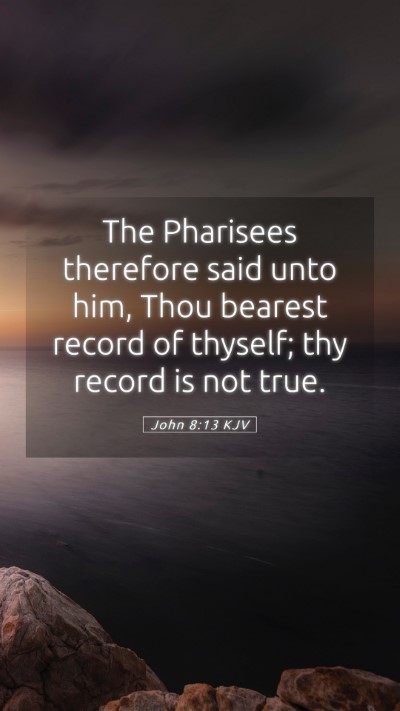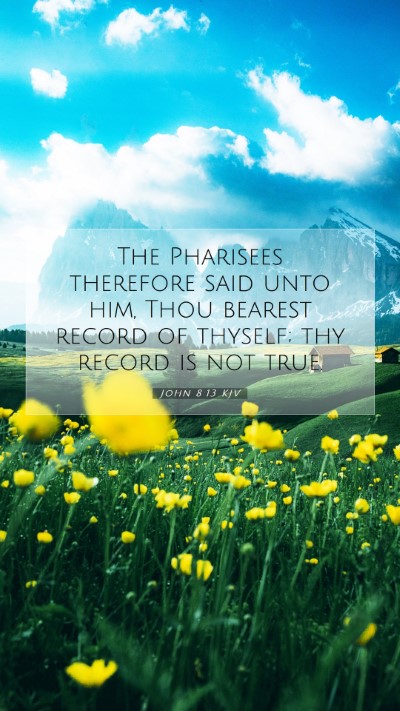Bible Verse Commentary on John 8:13
John 8:13: "The Pharisees therefore said unto him, Thou bearest record of thyself; thy record is not true."
Overview of John 8:13
This verse is part of a larger dialogue between Jesus and the religious leaders of His day, the Pharisees. Throughout this interaction, Jesus speaks about His divine authority and relationship with the Father, while the Pharisees challenge Him, questioning the validity of His testimony.
Key Themes and Insights
- Challenge of Authority: The Pharisees confront Jesus, claiming that His testimony about Himself lacks authenticity. This reflects the common skepticism that Jesus faced during His ministry.
- Self-Testimony: In Jewish law, the credibility of a witness relies on multiple attestations. The Pharisees point out their understanding of the law, which sets the stage for Jesus to explain His divine origin and authority.
- Truth of Jesus’ Testimony: Despite the Pharisees' claims, Jesus will argue throughout the chapter that His testimony is indeed valid because it is backed by the Father.
Bible Verse Meanings and Interpretations
From the commentaries of Matthew Henry, Albert Barnes, and Adam Clarke, the interpretation of this verse revolves around several key ideas:
- Matthew Henry: He highlights the spiritual blindness of the Pharisees, noting their inability to recognize truth even when it stands before them. Henry posits that their reliance on the law blinds them to the grace and new covenant that Jesus embodies.
- Albert Barnes: Barnes underscores the significance of proper witness. He elaborates that while the Pharisees point out the law regarding self-testimony, Jesus will reveal that His testimony is sanctioned by God Himself, emphasizing His divine nature.
- Adam Clarke: Clarke discusses the implications of the Pharisees’ remarks. He illustrates that despite their education and adherence to the law, they fail to see that Jesus is the fulfillment of the law, thus questioning the very source of true knowledge and authority.
Understanding the Context
The context surrounding John 8:13 is critical for a comprehensive understanding. This dialogue occurs shortly after the incident of the woman caught in adultery, where Jesus displays compassion while challenging the legalistic perspectives of the Pharisees.
As the conversation progresses, Jesus asserts that His judgment is not solitary, for He and the Father are one in purpose and message. This sets a theological foundation that transcends the limited understanding of the Jewish leaders.
Practical Application
Understanding Scripture such as John 8:13 allows believers to reflect on their approach to truth. Just as the Pharisees were challenged by Jesus’ authority, modern readers are invited to assess their own perspectives on Christ’s identity and the authority of His teachings.
It prompts individuals to ask:
- How do we recognize and validate truth in our own lives?
- Are we, like the Pharisees, sometimes blind to the truth due to preconceived notions or traditions?
- In what ways can we embrace the fullness of Jesus’ authority as we seek to apply His teachings?
Related Bible Cross References
- John 5:31: Jesus speaks of the witness He carries, providing a context for His assertion of truth.
- John 8:14: Jesus clarifies the nature of His testimony, reinforcing that His witness is valid because He knows where He comes from and where He is going.
- Matthew 18:16: The principle of testimony in groups shows the importance of multiple witnesses.
Conclusion
The encounter in John 8:13 serves as a profound reminder of the necessity of divine insight for understanding truth. It urges believers to remain vigilant against spiritual blindness and to earnestly seek the fullness of Christ’s teachings. Unlocking the meanings of Bible verses like this one enriches Bible study groups, enhances personal reflection, and encourages believers to apply these truths in everyday life.
Further Study Resources
- Bible Study Guides: For deeper insights into similar passages.
- Bible Study Lessons: To explore context and application of Scripture.
- Online Bible Study: Engaging with communities to discuss interpretations and practical applications.


